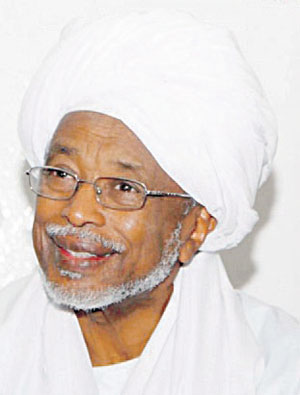Opinion
Imam Abdulrahman Al-Mahdi: A Nation

By Professor Ezzeldin Omar Musa
It was customary for the “Father of the Press,” Ahmed Youssef Hashim, to host social gatherings in his new house in Khartoum 2—a newly established upscale neighborhood—during the early 1950s until his passing in 1958. These gatherings were akin to a salon attended by a select group of intellectuals, literary figures, and politicians, though not on a regular basis. Among those I recall attending were Al-Mahjoub, Haleem, Al-Mardi, and Dawood Abdul Latif. Occasionally, Abdulrahman Mukhtar would join with updates from the newspapers, before his marriage to Umm Salama—Ahmed Youssef’s niece—and prior to founding Al-Sahafa newspaper. These sessions were intellectual and political forums that, through the influence of some attendees, shaped or supported significant events.
As a fortunate youth within the family, I had the privilege of witnessing some of these sessions. This was due to my relation to Aba Al-Qasim Hashim, Ahmed Youssef’s nephew through his modest aunt Salha Mohammed Musa, and because my father, Ahmed Mohammed Musa, was Ahmed Youssef’s cousin. I was attending Khartoum Elementary School (now the Baraka Tower), separated from Ahmed’s newspaper office, New Sudan, by the expanse of Ibn Jazeera Square. Whenever there were guests, we would accompany him. This continued as much as circumstances allowed until his passing—may he rest in peace.
Many memories remain from those days, and I begin with one: the day leader Al-Azhari informed Parliament of his intention to declare Sudan’s independence the following day. I vividly recall that day. I was 19 years old, and many people flocked to Ahmed Youssef’s house, including regular attendees of the salon from Parliament and its surroundings. Anxiety and tension filled the air regarding the events that would unfold the next day if national consensus wasn’t secured for Al-Azhari’s declaration of independence in Parliament. Fears loomed heavily over Khartoum.
Speculation centered around the possibility of the Egyptians opposing the move, potentially fracturing the National Unionist Party. The British feared the emergence of an African leadership, especially with the rise of Nasser, Nkrumah, Sekou Touré, and Nyerere. Concerns grew about their possible manipulation of the Independent Bloc (Al-Ummah Party) or the southern parties. The general belief was that the Independent Bloc held the key to the outcome. If they supported the proposal, success would follow. If not, those apprehensive of Al-Azhari’s leadership might exploit the situation, potentially sparking unrest.
That afternoon, a group—including Al-Mahjoub and Sheikh Al-Mardi, two of the most prominent politicians of the era—rushed to prevent any crisis. The atmosphere in Khartoum that evening was tense and fearful. However, by sunset, Ahmed Youssef and his companions returned with their spirits lifted, their faces glowing, and smiles spreading across their lips. They shared the news: the great Imam Abdulrahman Al-Mahdi had risen to the occasion, affirming his commitment to the project of independence, regardless of who declared it. He dispatched Al-Sadiq, Mamoun Sharif, and Al-Nugdallah to coordinate the announcement with Al-Azhari, emphasizing that the critical matter was the declaration itself, not who made it.
Years later, in 1980, Mahmoud Al-Fadli recounted the same story to me. At the time, Al-Fadli was aligned with Al-Azhari and described the prevailing anxiety, fears of conflict, and the collective sigh of relief when the Imam’s delegation brought the good news. Hearts were reassured, confidence restored, and joy spread throughout Khartoum as the city awaited the dawn of a new era.
The following day, the nation stood united because the Imam, a towering figure, embodied the essence of unity. He was Sudan, and Sudan was him. It’s no surprise that he wept as Sudan’s flag was raised, with tears streaming down his face.
This “nation” of a man was Sudan in every sense: in building the Ansar sect, symbolized by the crescent of the north embracing the spear of the south; in his political party, which was open to all Sudanese striving for independence under the motto, “Every Ansari is a member of the Ummah Party, but not every member of the Ummah Party is an Ansari.” He attracted countless educated Sudanese, both from the Ansar and beyond.
Moreover, this Sudanese “nation” opened his home and heart to alleviate people’s hardships, earning the saying: “Abu Aluwa’s Fatiha is handled by Abu Abdu.” His home became a sanctuary for writers, poets, artists, and intellectuals, especially during his annual birthday celebration on the first day of Eid Al-Fitr. Al-Mahjoub’s ode to him, “The feast has arrived; where is the joy and celebration?”, remains a testament to the values embodied by the Imam—the “nation” of Sudan.
So, when will we study this legacy? Or are we condemned to diminish our great figures—our “Sudan” and our “nations”—into polarizing, destructive binaries? How far we have fallen, to the point where even shame despises us.
How magnificent you are, O Imam, O towering figure, O human, O symbol, O Sudan, O nation! Embracing you lifted us to the stars, inspiring us to strive toward greatness.



